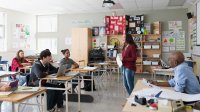Hosting Student-Led Unconferences
Planning and leading a debriefing after a unit of study gives students a chance to practice presentation skills and highlight their learning.
Your content has been saved!
Go to My Saved Content.Empowering students is critical for boosting classroom engagement, building positive classroom communities, and creating a culture where teacher-student relationships can grow. Research highlights the profound impact of student empowerment on various aspects of a student’s educational journey. When students feel empowered, the benefits are numerous: better grades, fewer behavioral incidents, increased extracurricular participation, and higher educational aspirations. One way to empower student voice, choice, and agency after a unit of study is by utilizing student-led learning development with an unconference.
The Unconference Approach
In response to traditional learning conferences that became characterized by predetermined agendas and speakers, the unconference was born to shift how professional development takes place. Unconferences throw away the rule book and allow for empowered conversations, voice, choice, and autonomy in learning. An unconference is a bottom-up approach where participants drive the agenda and propose and lead sessions, dictating the schedule and content to be shared based on their interests and expertise.
In my classroom, unconferences offer a unique opportunity for students to take charge of their learning when finishing a unit of study. The unconference approach allows each student the opportunity to lead their own and peers’ development, ask questions on various topics, and offer their own unique perspective and expertise on learning in the classroom.
By organizing and participating in these dynamic events, students are not only learning about a particular topic but also developing essential skills like event planning, collaboration, critical thinking, and communication. These skills are transferable and highly valuable in both academic and real-world contexts. As students are actively involved in planning and organizing the unconference in the classroom, they become more invested in their education. This sense of ownership leads to increased engagement, curiosity, and enthusiasm for learning.
4 Steps to Implementing Student-Led Unconferences
1. Introduce the concept. Begin by explaining the concept of unconferences to your students. Emphasize the participant-driven nature of these events and how the students can take charge of their learning. Introduce the idea the day before so that they can begin to percolate ideas for the conference.
2. Brainstorm topics. The day of the conference, allow students to look back at their notes, learning, projects, and assessments to get ideas for the unconference day in class. Encourage them to brainstorm topics they are passionate about or curious to explore further from the unit. This can range from reviewing a specific skill to showcasing tricks and tips for the content, all the way to individual students showcasing how they are applying the skills in everyday life.
3. Outline the planning process. Guide students through the process of planning the unconference. Have them reserve parts of the classroom for presentations and panel discussions, as well as space for a question-and-answer wall facilitated by students.
Next, as a group, have the class collaboratively establish community principles or guidelines that promote respectful and inclusive discussions. These principles should ensure that all participants feel welcome and have the opportunity to contribute effectively. It’s also important to agree upon timelines for sessions and breaks to manage the event’s schedule efficiently.
Planning the presentations, spaces for working, and time frames on the board allow students to break down the use of a given amount of class time to hold the conference. After students plan out the conference spaces, time frames, and activities, they will choose a place to start.
Students look to the plan to see whether they are facilitating or finding a session at any given time. Students then can go to any session that interests them. I encourage students, once there, to leave each session with a glow and a grow that they write on paper, whether presenting or participating. The glow is feedback on something that was done well, and the grow is something that could be improved. I use this visual to help guide the feedback.
Just recently in class, the students organized an unconference to wrap up our unit on the argumentative essay. Students actively participated in diverse sessions tailored to their interests and needs. One session, “Effective Thesis Crafting,” was initiated by a peer, offering participants the chance to refine their skills in constructing persuasive thesis statements. Another engaging discussion, “Counterargument Mastery,” led by a fellow student, encouraged classmates to anticipate and skillfully address opposing viewpoints in their essays.
The session with the most attendees, “Bashing Writer’s Block,” was hosted by a resourceful student who shared creativity hacks gathered from the internet to overcome writer’s block. Additionally, a panel discussion, hosted by students from the school’s debate team, provided diverse perspectives and real-world insights into crafting compelling arguments. They answered questions and offered a unique debate-oriented perspective on argumentation.
These student-driven sessions empowered learners to delve deeper into what they learned, and I even gained new valuable tools from their unique perspectives.
4. Reflect and learn. After the unconference, facilitate discussions where students reflect on their experiences. What did they learn? How did the event impact their understanding of the topic? Students can use their glow and grow feedback from the sessions they went to or facilitated.
Student-Led Learning
Student-led unconferences offer a transformative way to empower students and enhance their learning journeys. By allowing students to shape their own educational experiences, educators can tap into the innate curiosity and passion that students possess.
These unconferences can catalyze positive change through research-backed empowerment, fostering engagement, collaboration, and a lifelong love for learning. Unconferences are a way to enrich classrooms so that students are not just participants but leaders in their learning adventures.
